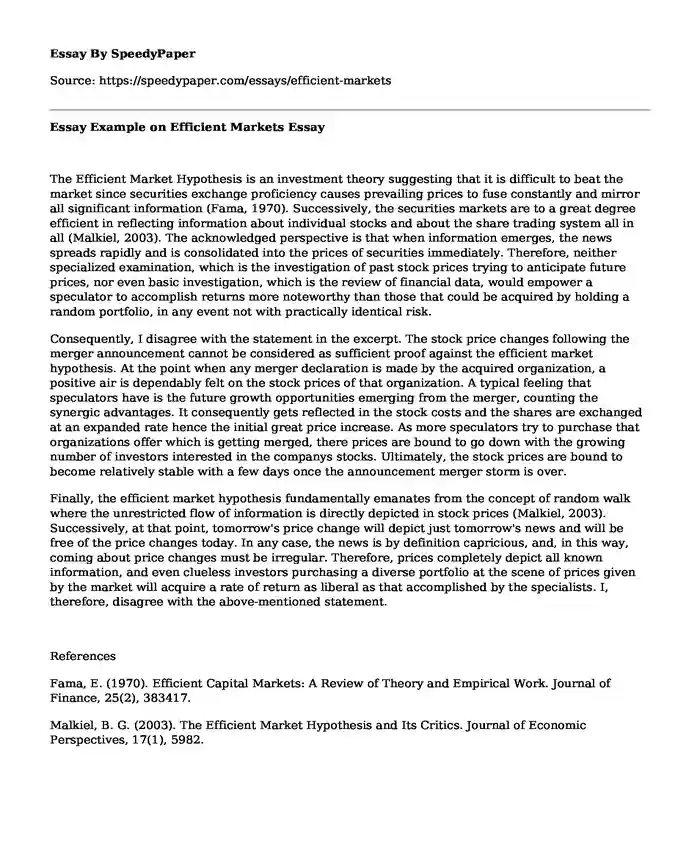The Efficient Market Hypothesis is an investment theory suggesting that it is difficult to beat the market since securities exchange proficiency causes prevailing prices to fuse constantly and mirror all significant information (Fama, 1970). Successively, the securities markets are to a great degree efficient in reflecting information about individual stocks and about the share trading system all in all (Malkiel, 2003). The acknowledged perspective is that when information emerges, the news spreads rapidly and is consolidated into the prices of securities immediately. Therefore, neither specialized examination, which is the investigation of past stock prices trying to anticipate future prices, nor even basic investigation, which is the review of financial data, would empower a speculator to accomplish returns more noteworthy than those that could be acquired by holding a random portfolio, in any event not with practically identical risk.
Consequently, I disagree with the statement in the excerpt. The stock price changes following the merger announcement cannot be considered as sufficient proof against the efficient market hypothesis. At the point when any merger declaration is made by the acquired organization, a positive air is dependably felt on the stock prices of that organization. A typical feeling that speculators have is the future growth opportunities emerging from the merger, counting the synergic advantages. It consequently gets reflected in the stock costs and the shares are exchanged at an expanded rate hence the initial great price increase. As more speculators try to purchase that organizations offer which is getting merged, there prices are bound to go down with the growing number of investors interested in the companys stocks. Ultimately, the stock prices are bound to become relatively stable with a few days once the announcement merger storm is over.
Finally, the efficient market hypothesis fundamentally emanates from the concept of random walk where the unrestricted flow of information is directly depicted in stock prices (Malkiel, 2003). Successively, at that point, tomorrow's price change will depict just tomorrow's news and will be free of the price changes today. In any case, the news is by definition capricious, and, in this way, coming about price changes must be irregular. Therefore, prices completely depict all known information, and even clueless investors purchasing a diverse portfolio at the scene of prices given by the market will acquire a rate of return as liberal as that accomplished by the specialists. I, therefore, disagree with the above-mentioned statement.
References
Fama, E. (1970). Efficient Capital Markets: A Review of Theory and Empirical Work. Journal of Finance, 25(2), 383417.
Malkiel, B. G. (2003). The Efficient Market Hypothesis and Its Critics. Journal of Economic Perspectives, 17(1), 5982.
Cite this page
Essay Example on Efficient Markets. (2019, Sep 26). Retrieved from https://speedypaper.net/essays/efficient-markets
Request Removal
If you are the original author of this essay and no longer wish to have it published on the SpeedyPaper website, please click below to request its removal:
- Ethics in Consultancy - Free Essay Example
- Free Essay on Augmenting Productivity Through Strategic Planning
- Free Essay on the Relationship between Human Population and Environment Changes
- Negative and Positive Peer Influence. Free Essay Example.
- Essay Sample on Colonization and Resistance of Indio-America
- Essay Sample: A Rhetorical Analysis of Daddy Issues by Tsing Loh Tsing Loh
- Essay Example on Pros and Cons of Securing Citizens' DNA
Popular categories





